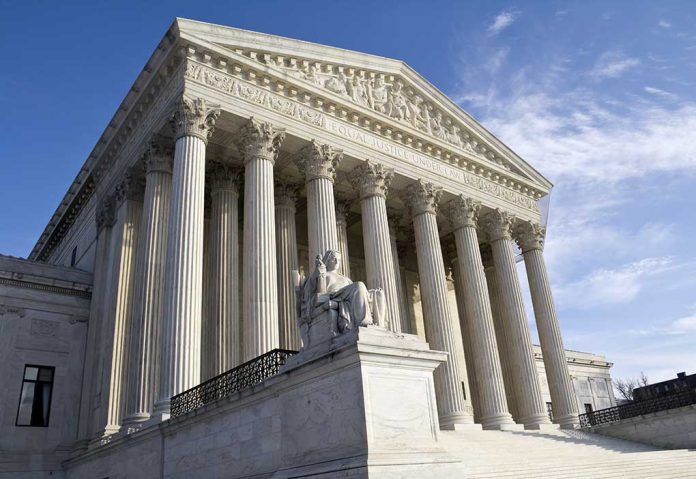
The Supreme Court’s refusal to hear an appeal regarding Boston’s elite high school admissions policy sparks debate over race-based considerations in education.
At a Glance
- Supreme Court rejected an appeal from Boston parents over a temporary admissions policy for elite high schools
- Policy allegedly discriminated against White and Asian students by using ZIP codes instead of entrance exams
- Justices Alito and Thomas dissented, criticizing the decision as perpetuating race-based affirmative action
- Case dismissed as policy had been changed, but raises ongoing questions about race in educational admissions
Supreme Court Declines to Hear Boston Admissions Case
The U.S. Supreme Court has declined to hear an appeal from the Boston Parent Coalition for Academic Excellence regarding a controversial admissions policy for the city’s elite high schools. The policy, implemented during the COVID-19 pandemic, replaced entrance exams with a system based on grades and ZIP codes, allegedly resulting in fewer admissions for White and Asian students.
The case involved Boston Latin School, Boston Latin Academy, and the John D. O’Bryant School of Mathematics and Science. In 2020, these prestigious institutions suspended their traditional entrance exams due to pandemic-related safety concerns, opting instead for an admissions process based on grade point averages and students’ ZIP codes.
Supreme Court rejects Boston parents' appeal claiming racial bias in an admissions policy https://t.co/QbZBoUqUEu
— Fox News (@FoxNews) December 10, 2024
Controversy Surrounding the Policy
The temporary policy sparked outrage among some parents who claimed it discriminated against White and Asian students. The Boston Parent Coalition for Academic Excellence sued the Boston School Committee in 2021, arguing that the new criteria violated the Supreme Court’s recent ruling on affirmative action in college admissions.
“The parents and students do not challenge Boston’s new policy, nor do they suggest that the city is simply biding its time, intent on reviving the old policy. Strictly speaking, those developments may not moot this case. But, to my mind, they greatly diminish the need for our review.” – Justice Neil Gorsuch
However, lower courts ruled that the admissions criteria were racially neutral. The 1st U.S. Circuit Court of Appeals determined that the Supreme Court’s decision on race-conscious college admissions did not affect Boston’s temporary policy, which was in place for only one year before being replaced with a standardized testing plan for the 2022-2023 school year.
Supreme Court rejects appeal from Boston parents over race bias in elite high school admissions https://t.co/sRPuNCM3SW
— PottstownMercury (@MercuryX) December 9, 2024
Supreme Court’s Decision and Dissenting Opinions
The Supreme Court’s decision not to hear the case effectively upholds the lower court’s ruling. However, this decision was not unanimous, with Justices Samuel Alito and Clarence Thomas dissenting. They argued that the case exemplified ongoing issues with race-based considerations in educational admissions practices.
“a glaring constitutional error that threatens to perpetuate race-based affirmative action in defiance of” – Alito https://www.voicenews.com/2024/12/09/supreme-court-rejects-appeal-from-boston-parents-over-race-bias-in-elite-high-school-admissions/?preview_id=387334
Justice Neil Gorsuch, while not dissenting, expressed concerns about the policy. However, he stated that the court did not need to hear the case since the policy had been revised, diminishing the urgency for Supreme Court review.
Implications and Ongoing Debate
This case highlights the ongoing debate surrounding race-based considerations in educational admissions. It comes in the wake of the Supreme Court’s landmark decision in Students for Fair Admissions v. Harvard, which ruled that using race in college admissions violated the 14th Amendment’s Equal Protection Clause.
While the Boston case was dismissed due to the policy’s temporary nature, it raises questions about how schools and universities will navigate admissions processes in light of recent Supreme Court rulings on affirmative action. The debate over ensuring diversity in education while adhering to constitutional principles remains a contentious and complex issue in American society.
Sources:
- Supreme Court rejects Boston parents’ appeal claiming racial bias in an admissions policy
- Supreme Court rejects appeal from Boston parents over race bias in elite high school admissions
- Supreme Court rejects appeal from Boston parents over race bias in elite high school admissions
- Supreme Court rejects appeal from Boston parents over race bias in elite high school admissions
- Supreme Court rejects Boston parents’ appeal claiming racial bias in an admissions policy














